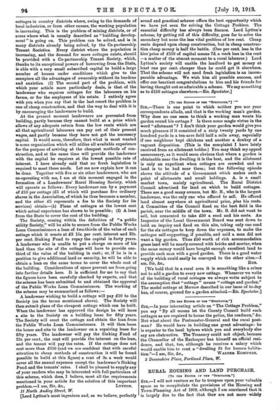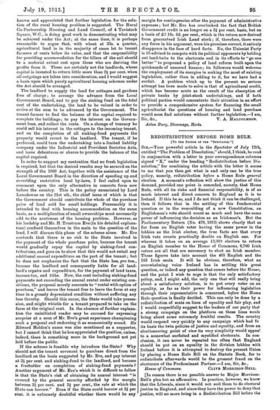RURAL HOUSING AND LAND PURCHASE.
[TO THE EDITOR CF THE "SpEcrATort.-] SIR,—I will not venture so far to trespass upon your valuable space as to recapitulate the provisions of the Housing and Town-Planning Act of 1909. although I am convinced that it is largely due to the fact that they are not more widely
known and appreciated that further legislation for the solu- tion of the rural housing problem is suggested. The Rural Co-Partnership Housing and Land Council, of 4 Tavistock Square, W.C., is doing good work in demonstrating what may be achieved under the Act; at the same time, it is perhaps reasonable to argue that, with wheat at 33s. a quarter, agricultural land is in the majority of cases let to tenant farmers at rents below its value, and that the responsibility for providing accommodation for the tillers of the soil should to a material extent rest upon those who are deriving the profits from it. These are certainly not the landlords, whose capital is invested to return little more than 2/ per cent. when all outgoings are taken into consideration, and I would suggest a basis upon which purely agricultural housing schemes under the Act should be arranged.
The landlord to supply the land for cottages and gardens free of charge ; to arrange the advance from the Local Government Board, and to pay the sinking fund on the total cost of the undertaking, the land to be valued in order to arrive at the sum to be advanced by the Government. The tenant farmer to find the balance of the capital required to complete the buildings; to pay the interest on the Govern- ment loan, and collect the rents. On a change of tenancy he could sell his interest in the cottages to the incoming tenant, and on the completion of all sinking-fund payments the property would revert to the landlord. The tenant, if he preferred, could turn the undertaking into a limited liability company under the Industrial and Provident Societies Acts, and issue debentures or shares to provide the balance of the capital required.
In order to support my contention that no fresh legislation is required, but that the desired results may be secured on the strength of the 1909 Act, together with the assistance of the Local Government Board in the direction of speeding up and overriding restrictive local by-laws, I feel called upon to comment upon the only alternative in concrete form now before the country. This is the policy enunciated by Lord Lansdowne on the 21st ult., the chief issue of which is that the Government should contribute the whole of the purchase price of land sold for small holdings. Presumably it is intended to deal with housing accommodation on the same basis, as a multiplication of small ownerships must necessarily add to the acuteness of the housing problem. However, as his lordship and Mr. H. Trustram Eve (in his detailed explana- tion) confined themselves in the main to the question of the land, I will discuss this phase of the scheme alone. Mr. Eve contends that there is no risk to the State involved in the payment of the whole purchase price, because the tenant would gradually repay the capital by sinking-fund con- tributions, and goes on to show that this would not entail any additional annual expenditure on the part of the tenant ; but he does not emphasize the fact that the State has, pro tem., become the landlord and consequently liable for all land- lord's repairs and expenditure, for the payment of land taxes, income-tax, and tithe. Now, the rent including sinking-fund payments not exceeding the annual rental under existing con- ditions, the proposal merely amounts to "rental with option of purchase," and leaves the tenant free to leave the farm at any time in a grossly depreciated condition without suffering any loss thereby. Should this occur, the State would take posses- sion, and might whistle for a tenant prepared to take on the farm at the original rent. In the absence of further explana- tion the uninitiated reader may be excused for expressing surprise at a man of Mr. Eve's great experience championing such a proposal and endorsing it as economically sound. Sir Edward Holden's name was also mentioned as a supporter, but I cannot think that he has appreciated the position, unless, indeed, there is something more in the background not yet laid before the public.
If the scheme is feasible why introduce the State P Why should not the tenant covenant to purchase direct from the landlord on the basis suggested by Mr. Eve, and pay interest at 31 per cent. and sinking-fund to the landlord, and become a freeholder on completion of sinking-fund payments ? Another argument of Mr. Eve's which it is difficult to follow is that the State's risk of obtaining its annual interest "is covered by the general security afforded by the margin between 3A per• cent. and 34 per cent., the rate at which the State can borrow." Even if the State could borrow at 34 per cent. it is extremely doubtful whether there would be any margin for contingencies after the payment of administrative expenses ; but Mr. Eve has overlooked the fact that British Government credit is no longer on a 34 per cent. basis, but on a basis of £3 18s. 6d. per cent., which is the return now derived from guaranteed Irish Land stock ; if, therefore, there were any force in his argument, were his premises correct, it entirely disappears in the face of hard facts. No, the Unionist Party is ill-advised to compete with its political opponents by holding out land-baits to the electorate and in its efforts to "go one better " to propound a policy of land reform built upon the quicksands of unsound finance; its followers would welcome the employment of its energies in making the most of existing legislation, rather than in adding to it, for we have had a surfeit. A problem which up to the present no serious attempt has been made to solve is that of agricultural credit, which has become acute as the result of the absorption of private banks by joint-stock undertakings, and if both political parties would concentrate their attention in an effort to provide a comprehensive system for financing the small agriculturist the questions of housing and land purchase would soon find solutions without further legislation.—I am, Sir, &c., V. A. MALCOLMSON. Aston Bury, Stevenage, Herts.











































 Previous page
Previous page